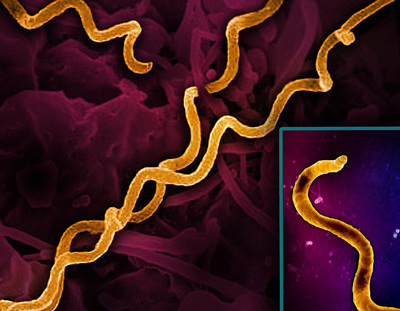Initiative to simplify testing process for an accelerated public health response.
September 4, 2024 – The National Institutes of Health’s National Institute of Allergy and Infectious Diseases (NIAID) has awarded grants for 10 projects to improve diagnostic tools for congenital and adult syphilis—conditions currently diagnosed with a sequence of tests, each with limited precision. The Centers for Disease Control and Prevention (CDC) estimates that adult and congenital syphilis cases increased by 80% and 183% respectively between 2018 and 2022—a crisis that prompted the U.S. Department of Health and Human Services (HHS)  to establish a national taskforce to respond to the epidemic.
to establish a national taskforce to respond to the epidemic.
(Pictured) Electron micrograph imagery of Treponema pallidum, the bacteria that cause syphilis, including a foreground close-up of a single particle (right). Spiral-shaped bacteria are colorized in gold. NIAID
“Syphilis antibiotics work, but antiquated testing makes it very difficult to ensure that people are appropriately diagnosed and fully treated,” said NIAID Director Jeanne M. Marrazzo, M.D., M.P.H. “Advanced diagnostics could streamline syphilis care and also enhance our ability to measure the efficacy of candidate syphilis vaccines and other prevention modalities.”
Syphilis is a common sexually transmitted infection caused by the bacterium Treponema pallidum. It can cause adult neurological and organ damage, as well as congenital abnormalities, stillbirths, and neonatal deaths. The CDC reports that U.S. syphilis incidence has increased since 2000, marked by a sharp rise in cases since 2019 and an escalating toll in medically underserved populations.
The current syphilis testing algorithm requires at least two antibody-based tests, which are based on decades-old technology. These tests are unable to reliably distinguish between antibodies from active versus resolved syphilis infection. They also cannot consistently confirm whether a course of antibiotics has successfully cleared the T. pallidum bacteria from the body. Fortunately, modern molecular techniques, such as nucleic acid amplification systems and platforms which detect fragments of a pathogen, are now in use for other infectious diseases and could be adapted for diagnosing syphilis.
The new NIAID grants explore a range of immunologic and diagnostic concepts, including basic research to improve understanding of infant immune responses to syphilis, novel tests to identify different parts of T. pallidum genomic material in infants and adults, measures of antibiotic resistance in T. pallidum strains, and testing platforms that are feasible to use at the point of care rather than an off-site laboratory. With a cumulative $2.4 million in funding distributed across recipients, the awards are as follows:
Magic Lifescience, Inc., Mountain View, California
Project title: Development of a novel syphilis molecular diagnostic assay for a point-of-care multiplexed genital ulcer panel test on giant magnetoresistive biosensors
Principal investigator: Elaine Ng, Ph.D. (early-stage investigator)
Grant: 1 R21 AI185972-01
Research at Nationwide Children's, Columbus, Ohio
Project title: Interrogating infant immune responses for diagnosis of congenital syphilis infection
Principal investigator: Masako Shimamura, M.D.
Grant: 1 R21 AI186003-01
University of California San Francisco
Project title: Multi-omic approaches to identify novel biomarkers for the diagnosis of syphilis in pregnancy and assessment of treatment response
Principal investigator: Stephanie Gaw, M.D., Ph.D.
Grant: 1 R21AI186006-01
University of Texas at Austin
Project title: A triad approach towards improved diagnostics for maternal and congenital syphilis
Principal investigator: Sanchita Bhadra, Ph.D. (early-stage investigator) with Randolph Hubach, Ph.D., M.P.H. (Purdue University)
Grant: 1 R21 AI185965-01
University of Texas Southwestern Medical Center, Dallas
Project title: Pre-analytic factors affecting molecular tests for congenital syphilis
Principal investigator: Jeffrey Sorelle, M.D. with Emily Adhikari, M.D.
Grant: 1 R21 AI185968-01
University of Victoria, British Columbia, Canada
Project title: Development of a direct diagnostic test for infectious and congenital syphilis
Principal investigator: Caroline Cameron, Ph.D.
Grant: 1 R21 AI186005-01
University of Washington, Seattle
Project title: Rapid and ultrasensitive aptamer-based detection technologies for T. pallidum Principal investigator: Stephen Salipante, M.D., Ph.D.
Grant: 1 R21 AI184484-01
University of Washington, Seattle
Project title: Rapid point-of-care detection of T. pallidum resistance to macrolides and tetracyclines by multiplexed loop-mediated amplification (LAMP)
Principal investigator: Joshua Lieberman, M.D., Ph.D. (early-stage investigator)
Grant: 1 R21 AI184749-01
University of Washington, Seattle
Project title: Sensitive Treponema pallidum genome recovery through tiling amplicon sequencing
Principal investigator: Alexander Greninger, M.D., Ph.D., M.S., M.Phil.
Grant: 1 R21 AI185726-01
Virginia Polytechnic Institute and State University, Blacksburg
Project title: Released peptidoglycan fragments are a biomarker for early stages of syphilis
Principal investigator: Brandon Jutras, Ph.D.
Grant: 1 R21 AI185998-01
NIAID conducts and supports research—at NIH, throughout the United States, and worldwide—to study the causes of infectious and immune-mediated diseases, and to develop better means of preventing, diagnosing and treating these illnesses. News releases, fact sheets and other NIAID-related materials are available on the NIAID website.
About the National Institutes of Health (NIH): NIH, the nation's medical research agency, includes 27 Institutes and Centers and is a component of the U.S. Department of Health and Human Services. NIH is the primary federal agency conducting and supporting basic, clinical, and translational medical research, and is investigating the causes, treatments, and cures for both common and rare diseases. For more information about NIH and its programs, visit www.nih.gov.
NIH…Turning Discovery Into Health®
Source & image: NIH








